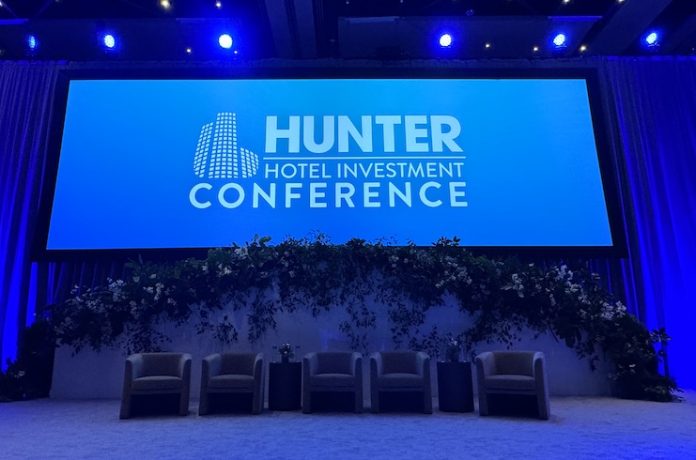
The Hunter Hotel Investment Conference (HUNTER) is underway at the Atlanta Marriott Marquis. Celebrating its 35th milestone year, the event drew over 2,100 attendees from 950 companies across 48 states, including 100 college students. Event programming and speakers include underrepresented groups within the hospitality industry and new programming aimed at engaging attendees. Lee Hunter, Chairman of the Hunter Hotel Investment Conference, shared, “This year’s conference theme comes about as a profound sense of purpose. Know no limits.”
During the opening session, Evan Weiss, co-founder, COO, and principal, LW Hospitality Advisors, led a panel titled “Market Overview: Financial Analysts + Forecasts,” which provided updates on the hospitality real estate lending landscape that’s currently experiencing difficult financial space and high rates.
Panelists suggested that the third and fourth quarters of this year are when the industry will see more large deals being completed. Kevin M. Davis, Americas CEO, JLL Hotels & Hospitality Group, mentioned, “The beginnings of the next cycle are underway…There are a lot of discussions that are taking place about sizable transactions, in many cases that are direct. And there’s a high probability that a lot of these deals will get done. You may be surprised in the third and fourth quarter of this year that there are large transactions getting done.”
Davis doubled down and said, “The bottom line is: On the surface, it appears like there’s not a lot going on in the market. But, in fact, there are a lot of discussions taking place and a lot of transactions going on behind the scenes that I think will get announced over the next couple of quarters.”
While it might appear that deal activity has been decreasing in the industry, Robert J. Webster, vice chairman and president, CBRE Hotels Institutional Group, said that the industry is up around 30 percent over this time last year, including debt and structured finance. “Things are pretty good. Industrial is doing incredibly well. There are a lot of huge trades that are effectuating there. That’s a really positive sign…I do believe you’re going to see in the second half of this year the velocity of trades increase.”
As interest rates have been high for all real estate assets, Teague Hunter, president and CEO, Hunter Hotel Advisors, noted, “Everyone keeps waiting to go back, when are the rates going to go down? That’s not happening. We’re not going back to 4 percent…For those of us old enough in the room to remember getting deals done at 7-8 percent, if that was the norm, we’re just going back to that. We’re going to have to figure out how to get these deals done. It’s not going to be easy. Deals aren’t easy right now.”
“What we’re having now is a broader conviction from the equity,” shared Daniel Peek, president and COO, Hodges Ward Elliott. “If you look at the market, we’ve had great fundamentals. Every market is an exception, really extraordinary fundamentals. So, I always look at the market as a three-legged stool; we had a lending market, we didn’t like the price, but there’s a lending market. And so, you can finance a hotel today and it’s a little more expensive than normal.”
For lenders looking for assets that will stand the test of time, the hotel industry does have its bright spots. Davis said, “We are seeing a significant spread compression in the lending space right now. If there’s a real bright spot in the market, it’s on the debt side…When lenders look at hospitality relative to other asset classes, they see a sector that is performing well. It’s been a great inflation hedge that will continue to perform well. As a result, we’ve seen more lenders come into the space, which has driven competition and spread compression. At the same time, we’re also starting to see folks who are not in the equity space start to take a look at hospitality suggesting that they’re interested in getting in. Ultimately, I see more liquidity moving into the space.”
The second half of 2024 is predicted to have a “robust transaction market,” Webster said. “Certain chain scales have a bid-ask spread differential that has precluded the transactions happening. Those who own real durable assets are in good, solid markets. Solid branding continues to perform.”
Davis noted that the industry is “at an inflection point. As I said, a lot of things are taking place beneath the surface, but there are a lot of things that, frankly, haven’t happened yet…Trust me, it’s coming. I’m not suggesting there’s going to be a tidal wave of distress, but what I am suggesting is that over the next 12-24 months, and some of it, frankly, is just the passage of time. There’s a greater drag on these assets, even assets that are performing well.”
And because of this status in the current financial landscape of the hospitality industry, investing in an asset now could be high risk, high reward. Webster said, “The smart money is starting to make bets right now. You’re going to see some large transactions effectuate. Over the next couple of months, that might turn some heads. They’re not focused on what the debt cost is today. They’re looking at the profitability four years down the road. If there’s an asset that’s core to your portfolio that you have to own, now’s a great time to go after that asset. I think that window is going to close.”
“What we learned over the past 20 years is durability matters,” Peek added. “If you’re buying select-service, which you can bind to a product in a location that’s younger and better to better position everything else. I’m very bullish on group, particularly resort group…durable assets that have a wide appeal from a demand perspective.”
With challenges arising in the lending landscape, hotel investors might benefit from sticking with what they know. For those looking to invest in deals, Hunter offered, “Invest in your backyard and in the asset class where you’re comfortable. Don’t go out of your comfort zone.”











